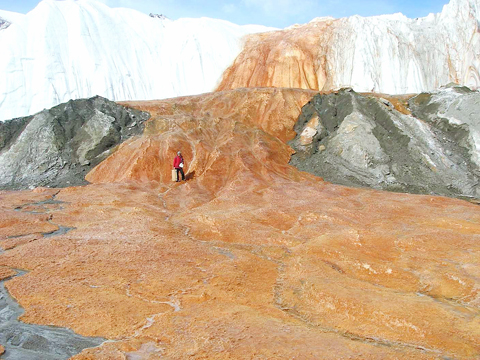US proposals for binding restrictions on Antarctic tourism have been adopted by countries with ties to the region in a bid to protect the continent’s fragile ecosystem, officials said on Friday.
Signatories of the Antarctic Treaty, launched in Washington 50 years ago, capped 11 days of talks in Baltimore, Maryland, by agreeing to impose mandatory limits on the size of cruise ships landing in Antarctica and how many passengers they can bring ashore.
Another resolution placed a mandatory shipping code on vessels in Antarctica, boosting shipping safety efforts underway at the International Maritime Organization, while a third enhanced environmental protection for the entire Antarctic ecosystem.

PHOTO: AP
“We are happy with the results,” said Evan Bloom, who led the US delegation at the summit, noting that the measures were largely in line with needs emphasized by US Secretary of State Hillary Clinton.
Although the measures were adopted by consensus without opposition, they were all subject to negotiation and will become legally binding once ratified by each of the 28 countries that have signed the Antarctic Treaty, he told reporters in a teleconference.
Although no specific mechanism was detailed to enforce the restrictions, signatories would be required to prevent ships with more than 500 passengers from reaching landing sites in Antarctica and allow up to 100 passengers on shore at any given time.
Nearly 400 diplomats, experts and polar scientists from 47 countries attended the meeting, which tackled environmental and territorial issues affecting the Antarctic.
The Antarctic Treaty Consultative Meeting (ATCM) also focused on promoting scientific research in the Antarctic, its chair Tucker Scully said.
He said there was “a major emphasis” on ensuring that the parties cooperated to support scientific research “to understand what is in fact happening to our planet with respect to climate.”
In opening the first joint session of the ATCM and the Arctic Council on April 6, Clinton said Washington would work with other countries surrounding the region “to strengthen peace and security and support economic development and protect the environment.”
The diplomatic chief said she and US President Barack Obama were “committed” to having the US Congress ratify the Law of the Sea Convention, a UN text on maritime rights drafted in 1982.
The US signed the convention in 1994 after securing changes to certain provisions deemed against US interests. But Congress never ratified the treaty, despite a lobbying effort by former US president George W. Bush in 2007.
Clinton said Obama had provided the US Congress with an annex to the treaty for ratification. The annex set the obligations of signatories in case of an environmental catastrophe in the South Pole region.

Eleven people, including a former minister, were arrested in Serbia on Friday over a train station disaster in which 16 people died. The concrete canopy of the newly renovated station in the northern city of Novi Sad collapsed on Nov. 1, 2024 in a disaster widely blamed on corruption and poor oversight. It sparked a wave of student-led protests and led to the resignation of then-Serbian prime minister Milos Vucevic and the fall of his government. The public prosecutor’s office in Novi Sad opened an investigation into the accident and deaths. In February, the public prosecutor’s office for organized crime opened another probe into

RISING RACISM: A Japanese group called on China to assure safety in the country, while the Chinese embassy in Tokyo urged action against a ‘surge in xenophobia’ A Japanese woman living in China was attacked and injured by a man in a subway station in Suzhou, China, Japanese media said, hours after two Chinese men were seriously injured in violence in Tokyo. The attacks on Thursday raised concern about xenophobic sentiment in China and Japan that have been blamed for assaults in both countries. It was the third attack involving Japanese living in China since last year. In the two previous cases in China, Chinese authorities have insisted they were isolated incidents. Japanese broadcaster NHK did not identify the woman injured in Suzhou by name, but, citing the Japanese

YELLOW SHIRTS: Many protesters were associated with pro-royalist groups that had previously supported the ouster of Paetongtarn’s father, Thaksin, in 2006 Protesters rallied on Saturday in the Thai capital to demand the resignation of court-suspended Thai Prime Minister Paetongtarn Shinawatra and in support of the armed forces following a violent border dispute with Cambodia that killed more than three dozen people and displaced more than 260,000. Gathered at Bangkok’s Victory Monument despite soaring temperatures, many sang patriotic songs and listened to speeches denouncing Paetongtarn and her father, former Thai prime minister Thaksin Shinawatra, and voiced their backing of the country’s army, which has always retained substantial power in the Southeast Asian country. Police said there were about 2,000 protesters by mid-afternoon, although

MOGAMI-CLASS FRIGATES: The deal is a ‘big step toward elevating national security cooperation with Australia, which is our special strategic partner,’ a Japanese official said Australia is to upgrade its navy with 11 Mogami-class frigates built by Japan’s Mitsubishi Heavy Industries, Australian Minister for Defence Richard Marles said yesterday. Billed as Japan’s biggest defense export deal since World War II, Australia is to pay US$6 billion over the next 10 years to acquire the fleet of stealth frigates. Australia is in the midst of a major military restructure, bolstering its navy with long-range firepower in an effort to deter China. It is striving to expand its fleet of major warships from 11 to 26 over the next decade. “This is clearly the biggest defense-industry agreement that has ever